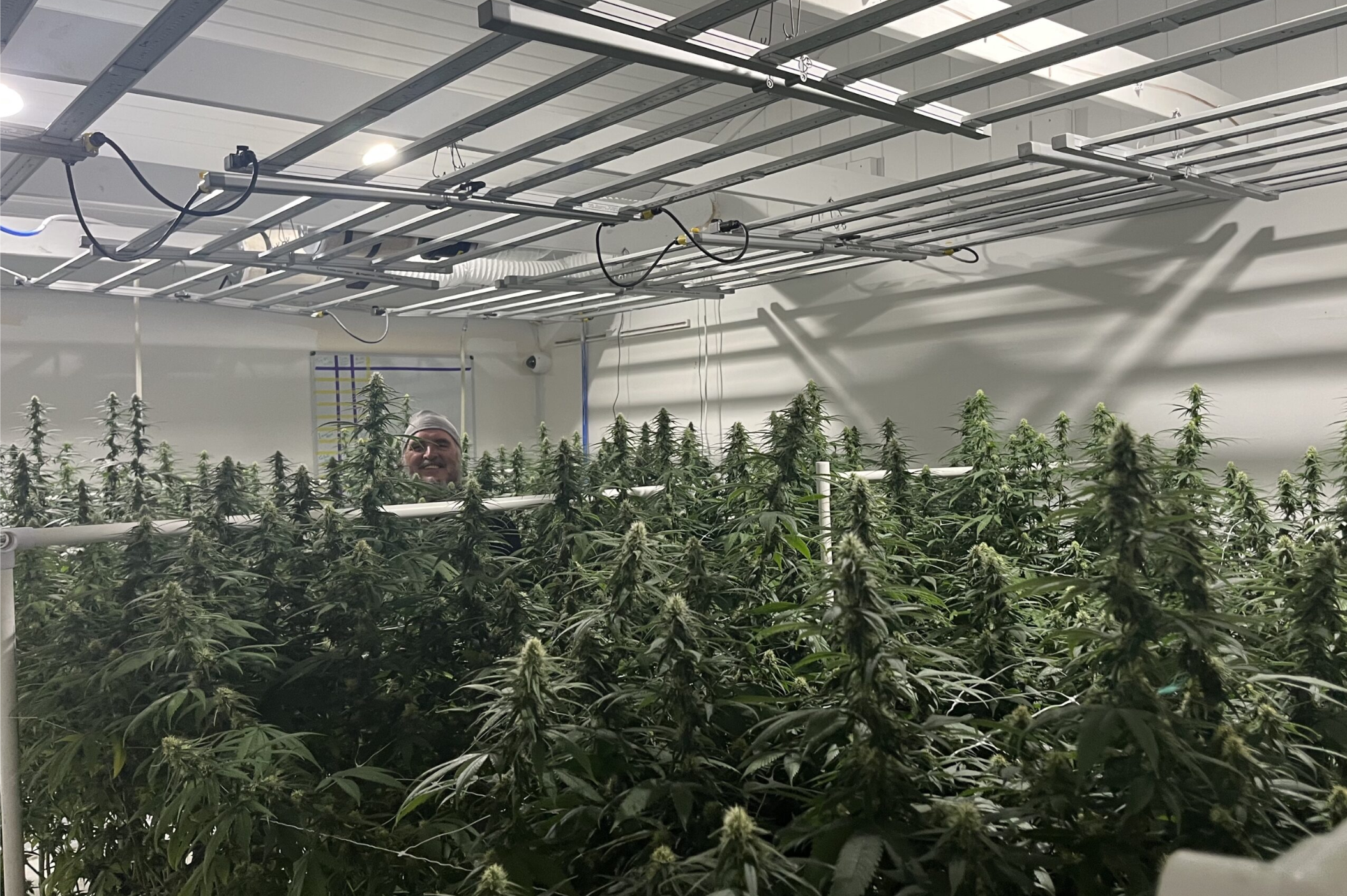
Many are grappling with financial uncertainty of investing their life savings as they work to make their marijuana businesses a success
BY: REBECCA RIVAS
Missouri Independent
Samantha Blum hasn’t been able to secure investors for her small-scale marijuana cultivation facility in the two years since Missouri awarded her a microbusiness license.
So she and her longtime partner, Anthony La Pietra, decided to give up and fund the entire operation themselves, cashing in La Pietra’s retirement to build a greenhouse in Adrian, an hour outside of Kansas City.
After two years of “blood, sweat and tears,” they finally received the state’s final approval to begin operating on Sept. 3. But just hours after the state’s email arrived, a massive storm crushed one side of the greenhouse.
“To go from such a high to such an incredibly bottom low…” she said. “It’s been such a roller coaster.”
Despite the setback, her family rallied to fix the wall, and now their business, Bud Wizard, is expected to have its first harvest in the coming weeks.
Blum’s facility is among the 12 microbusinesses the state has approved to begin operating out of 68 total licenses issued. Two are dispensaries. The rest are wholesale licenses like Blum’s that can grow up to 250 plants and manufacture marijuana products.
The microbusiness program — sometimes called the social-equity cannabis program — was designed to boost opportunities in the industry for people in disadvantaged communities that have been most impacted by the war on drugs. It began in 2023, after passing as part of the constitutional amendment to legalize recreational marijuana in 2022.
Up until this summer, the state had approved only a handful licenses to commence operations – which involves meeting rigorous health standards and security protocols. But in the past few months, the microbusiness community has finally started to fill in, with the state greenlighting a surge of cultivation licensees.
Like Blum, many of these owners stopped looking for funding and finally decided to put their life savings into getting the business off the ground. Now they’ve either had their first harvest this month or are expecting one in the next few weeks.
James Mondl, owner of Klondike Cannabis micro cultivation facility in Farmington, just watched his first harvest ship Tuesday to another licensed facility for the manufacturing phase.
“I haven’t completely exhaled, to be honest,” he said. “We’ve got a lot of time and money in this, and so to see the product leave today was as big a step – maybe a bigger one than when we brought plants in.”
Wholesalers’ products can legally only go to the two operational microbusiness dispensaries at the moment: 816 Dispensary in Platte City and Kush 21 in Poplar Bluff. The Missouri Constitution mandates that micro cultivators only sell to micro dispensaries.
Lesley Turk, chief equity officer with the Missouri Division of Cannabis Regulation who oversees the program, says the success of the micro community is like a “puzzle” because it depends on enough growers and dispensaries being up and running at the same time.
And both of them depend on the middleman – the manufacturers – or wholesalers who have gotten approval to make things like edibles and vapes.
“My excitement lies in the next six months,” Turk said.
As anticipation around more micros opening builds, so does the pressure to succeed.
Some license owners have already hit a number of road blocks and aren’t sure how much more they can invest into getting the business off the ground. Sam Vosburg, whose cultivation facility in Aurora has been operational since March, fears he invested his retirement on a failed business.
“We’re suffering right now,” Vosburg, owner of Ozark Mountain Gypsy LLC, told The Independent in October. “I don’t know how much longer I keep my lights on. Our electric bills are crazy, and we’re not making any money. So, yeah, it’s not looking good.”
However last week, Vosburg was approved to become one of the first two manufacturers, so he says he sees “a light at the end of the tunnel.”
Blum is the chairwoman of the Missouri Microbusiness Association, and she says her passion for the industry is a major driving force in making it through “one of the hardest things I’ve ever done in my entire life.”
The other driver is her four daughters.
“One day they’ll have dreams,” Blum said of her daughters, “and they’ll want to do something big, that’s insurmountable and accomplish it because they watched their mom and their dad accomplish it.”
Winning the lottery
Jimi Poe is the owner of 816 Dispensary, which was the first micro dispensary to open its doors to the public on Aug. 16. He’s quickly become a pillar for the microbusiness community, as someone to not only buy wholesalers’ products but also offer guidance on getting started.
“I’m not going to succeed if I can’t get wholesalers to succeed,” he said.
October was his biggest month yet, he said, with 1,500 transactions. He works closely with Blume LLC, one of the first operating wholesalers, because he says they’ve been “killing it” on their craft marijuana buds, or what the industry calls flower.
Up until now, a major challenge for Poe has been that no wholesale facility had the capability to manufacture products, such as edibles or vapes, because it can require expensive equipment.
With the state approving Vosburg and Kansas-City area microbusiness Urban Farm to manufacture products, Poe only expects his sales to grow. Another one in the Farmington area, Levity Cannabis, has also applied for approval, according to the division.
Nearly 20 years ago, Poe was sent to prison for 14 months on a non-violent marijuana felony – a charge that made it hard to find work or a place to live. Because the program aims to mend some of the harm marijuana prohibition has caused on people’s lives, his offense made him eligible to apply for the microbusiness program.
“When I was in prison, I was telling myself I was never going to sell cannabis again,” he said. “And now I’m legally able to sell cannabis at my own store. So it’s been a crazy journey, that is for sure.”
In 2023, Mitchell Alexander submitted one microbusiness application with his uncle, Jesse Greco, who qualifies for the program as a disabled veteran, and paid a $1,500 fee. Their application was entered into the lottery with more than 1,600 applications, and they were picked.
“He and I got together and decided to do it because we had nothing to lose,” Alexander said. “Because the lottery was: if you lose, you get your money back. If you win, you get your license.”
Alexander runs ReLeaf Dispensary in Kansas City, and he’s excited to grow in the way that he believes produces the best weed: living soil.
“No chemicals, no pesticides,” he said. “It’s literally, we’re just feeding the soil, and it’s as organic as it gets.”
For Greco, cannabis has always been something he turned to in his life for his PTSD, Alexander said. They’ve invested their own money and resources, and he’s optimistic about their first harvest that’s expected just before Christmas.
“We take so much pride in being completely independent,” he said. “We didn’t have any consulting groups help us out. We really just grassrooted this, and that’s exactly how we’re going to run this company.”
The team at Monsta Farms LLC in Sarcoxie has a similar mantra. It’s a group that includes two couples who’ve all pulled together their own money and time. They all have a “strength in the building,” said co-owner Chris Hampel, and everyone’s doing something they’re passionate about.
“I like watering the plants, for example,” Hampel said. “My wife hates watering the plants. But she’ll sit over there with dirt and pot plants all day long. And she loves that. I hate that.”
However, they each balance their cannabis work with their fulltime jobs, including two who work as nurses. Their collective dream is to make it their fulltime jobs.
They just had their first harvest on Monday.
Chad Sommer, an owner of Strainworx LLC in Lebanon, is also expecting his first harvest soon, he said, after two years of trying to keep “everything in check.”
“I mean, trying to keep family in check, trying to keep my fulltime job in check, and then also wanting to try to build this out,” he said.
His specialty is industrial automation systems, and it’s taken time to finetune that process, he said. He got into cannabis because he suffered from migraines. He realized a cannabis gummy worked a lot better at controlling them than the expensive shots he was receiving.
“So from that point, it’s held a special position in my heart,” Sommer said.
Now his migraines are gone. His team had to “hit several retirement funds,” to start up the business, but they’re optimistic.
“One thing that is a challenge is for many of the micros…starting resources,” he said. “It is a tough start. Everything is so expensive with the hope that one day you get a return.”
Financial troubles

When Vosburg’s cultivation facility Ozark Mountain Gypsy LLC got its approval to open in March, he was feeling “very optimistic.”
“The only thing I didn’t calculate was the delays from the state,” he said.
State marijuana rules mandate that regulators approve labels before products are sent to stores. And it took months for that approval to come back.
“Now they’re putting all these tutorials on how to do this,” Vosburg said of the labels and packaging. “We were doing this from scratch with no help.”
Turk said the division has worked to improve tutorials, and now each facility has a designated compliance representative who can help guide the micros through the labeling and packaging approval process.
Another challenge for his team has been the lack of manufacturing equipment. It’s been hard to compete with the other companies that are selling only flower and pre-rolled joints.
All together, Vosburg estimates they’ve put $500,000 of their own money into the business. And he fears they could lose it all at any moment.
But as of last week, Vosburg was approved to manufacture products on a small scale, providing him with a way forward.
“I could pay my electric bill if I can sell a few dabs by the end of the month,” he said.
Veteran David Huckins owns a dispensary license in Columbia with his wife, and they lead a weekly podcast to help microbusinesses share resources on a variety of topics.
But they aren’t anywhere close to being able to open, he said.
While the cultivators can often find land to build a facility in rural areas, dispensaries need to be in places with high visibility and traffic. And that’s hard when landlords often don’t want to lease a building to dispensaries, Huckins said, and he can’t get capital to buy a building.
The Missouri Division of Cannabis Regulation is not aware of any microbusinesses that have received loans from banks, a spokesperson said.
“It’s so hard for the cannabis businesses,” he said. “I don’t qualify for small business loans. So far, this has not been the blessing that I hoped it was going to be.”



